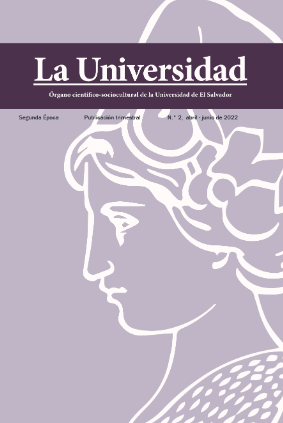Competencias digitales docentes y transformación digital educativa
Keywords:
Digital competences, Digital transformation, Digital technologies, Digital competence frameworksAbstract
This article presents an analysis of the application of digital skills for digital transformation, with emphasis on the educational field and based on the scientific literature consulted. The article focuses on the study of some international models of digital competence that incorporate a proposal of different digital competences distributed in sections with certain characteristics and levels of mastery of digital technologies, as well as instruments that facilitate the teacher to carry out a self-assessment. to measure the level of progression in the development of digital skills in their academic work. In addition, a review of the scientific literature that refers to the topic of digital transformation, its definition and elements that contribute to its achievement is carried out. As a result of this research, it has been found that digital transformation and innovation are digital skills, considered at the highest levels of mastery of digital technologies and that therefore there is a relationship between digital skills and digital transformation, where institutional support is essential to successfully reduce the digital divide and contribute to the democratization of education from a perspective of equal opportunities, by providing technologies but also support tools in terms of continuous and permanent training as well as providing a legal framework that supports and strengthens these processes in which technologies play an essential role
Downloads
References
Anderson, T. & Dron, J. (2011). Three Generations of Distance Education Pedagogy. International Review of Research in Open and Distance Learning, 12(3).
Garrell, A., Guilera, L. (2019). La Industria 4.0 en la sociedad digital. Marge Books.
Bates, A.W. (2019). Teaching in a Digital Age (2ª ed.). Associates Ltd. https://pressbooks.bccampus.ca/teachinginadigitalagev2/
Cabero-Almenara, J., Romero-Tena, R., Barroso-Osuna, J., & Palacios- Rodríguez, A. (2020). Marcos de Competencias Digitales Docentes y su adecuación al profesorado universitario y no universitario. Revista Caribeña de Investigación Educativa (RECIE), 4(2), 137-158. https://doi.org/10.32541/recie. 2020.v4i2.pp137-158
Cardini, A., Bergamaschi, A., D’Alessandre, V. y Ollivier, A. (2021). Educar en tiempos de pandemia. Un nuevo impulso para la transformación del sistema educativo digital en la Argentina. Buenos Aires: CIPPEC y BID. https://www.cippec.org/ wp-content/uploads/2021/05/Cardini-et-al.-mayo-de-2021- Educar-en-tiempos-de-pandemia-III-1.pdf
Comisión Europea (2019). Key competences for lifelong learning, Publications Office. https://data.europa.eu/doi/10.2766/569540
DigCompEdu (2020). Marco europeo para la competencia digital de los educadores
https://sede.educacion.gob.es/publiventa/marco-europeo-para- la-competencia-digital-de-los-educadores-digcompedu/ competencia-digital/24685
Eaprendizaje (2020). Transformación Digital Educativa. Junta de Andalucía. https://www.juntadeandalucia.es/educacion/eaprendizaje/ tde/
España-Digital2026 (2022). La Agenda España Digital 2026. Gobierno de España. Ministerio de Asuntos Económicos y Transformación Digital - P. de la Castellana 162. 28071 - Madrid
https://portal.mineco.gob.es/es-s/ministerio/estrategias/Paginas/ 00_Espana_Digital.aspx
García-Aretio, L. (2018). ¿El blended learning como solución?. Contextos universitarios mediados. https://aretio.hypotheses. org/2437
García-Aretio, L. (2014). Bases, mediaciones y futuro de la educación a distancia en la sociedad digital. Editorial Síntesis.
Google for Education (2017). Seguridad digital vayas donde vayas [Video]. YouTube. https://www.youtube.com/watch?v=1uP- 57CJ63AM
INTEF (2022). El Marco de Referencia de la Competencia Digital Docente. Instituto Nacional de Tecnologías Educativas y de Formación del Profesorado (INTEF), Ministerio de Educación y Formación Profesional de España. https://intef.es/ wp-content/uploads/2022/03/MRCDD_V06B_GTTA.pdf
Liceda, E. (2011). La identidad digital. ANALES Nº 41 - Facultad de Cs. Jurídicas y Sociales. Universidad Nacional De La Plata, Argentina. http://sedici.unlp.edu.ar/bitstream/handle/ 10915/20717/Art+23.pdf?sequence=1
Martínez, R., Palma, A. y Velásquez, A. (2020). Revolución tecnológica e inclusión social: Reflexiones sobre desafíos y oportunidades para la política social en América Latina. CEPAL. https://www.cepal.org/sites/default/files/publication/ files/45901/S2000401_es.pdf
Mishra, P & Koehler, M. J. (2006). Technological Pedagogical Content Knowledge: A Framework for Teacher Knowledge. Teachers College Record, Columbia University, 108(6),1017-1054. https://www.punyamishra.com/wp-content/ uploads/2008/01/mishra-koehler-tcr2006.pdf
Moreno-Jabardo, J. (2018). Transformación digital. Editorial Elearning S.L., España. Ebook
Muñoz, V., Villalba, M. y Cruz, G. (2021). Transformación Digital en Colombia. https://books.google.com.sv/ books?id=_X1TEAAAQBAJ&pg=PA19&dq=Transformaci% C3%B3n+digital+educativa&hl=es&sa=X&ved= 2ahUKEwjNuMe1- 577AhXNSzABHfOYACI4ChDoAXoECAcQAg# v=onepage&q=Transformaci%C3%B3n%20 digital%20educativa&f=false
Naciones Unidas (2015). Objetivo de Desarrollo Sostenible 4. https:// www.un.org/sustainabledevelopment/es/education/
ObservatorioDigital-Comunicaweb (2017). Transformación digital. https://play.google.com/books/reader?id=4sZiDwAAQBAJ& pg=GBS.PT29&hl=en
Orange (2016). La Transformación Digital del Sector Educación. Fundación Orange. https://www.fundacionorange.es/ wp content/uploads/2016/11/eE_Buenas_practicas_transformacion_ digital_educacion.pdf
PNUD (2022). ¿Qué son los Objetivos de Desarrollo Sostenible? https:// www.undp.org/es/sustainable-development-goals
Schwab, K. (2016). La cuarta revolución industrial. World Economic Forum.
UNESCO (2019). Marco de competencias de los docentes en materia de TIC UNESCO. UNESCO. https://unesdoc.unesco. org/ark:/48223/pf0000371024?posInSet=6&queryId= 2040e240-9e44-4522-9456-27805b220bff
Downloads
Published
Issue
Section
License
Copyright (c) 2023 Authors who publish in Revista La Universidad agree to the following terms: Authors continue as owners of their works, non-exclusively assigning dissemination rights to La Universidad Journal under the standards of the Attribution-NonCommercial-ShareAlike License: CC BY-NC-SA 4.0. This license allows the use of a work to create another work or content, modifying or not the original work, as long as the author is cited, the resulting work is shared under the same type of license and has no commercial purposes(https://creativecommons.org/licenses/by-nc-sa/4.0/deed.es).

This work is licensed under a Creative Commons Attribution-NonCommercial-ShareAlike 4.0 International License.





